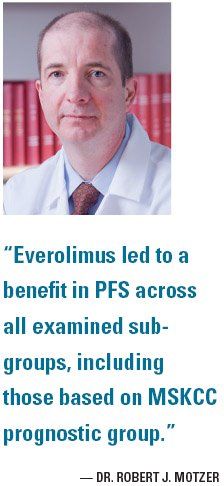Everolimus effective in treating metastatic RCC patients
CHICAGO-Everolimus prolongs progression-free survival in patients with metastatic renal cell carcinoma that has progressed despite treatment with inhibitors of the vascular endothelial growth factor (VEGF) receptor tyrosine kinase, finds an international phase III trial (RECORD-1) presented at ASCO 2008 (abstract LBA-5026).
ABSTRACT: This oral agent offers a new option when VEGF receptor tyrosine kinase inhibitors stop working.
CHICAGO-Everolimus prolongs progression-free survival in patients with metastatic renal cell carcinoma that has progressed despite treatment with inhibitors of the vascular endothelial growth factor (VEGF) receptor tyrosine kinase, finds an international phase III trial (RECORD-1) presented at ASCO 2008 (abstract LBA-5026).
The randomized, double-blind trial, led by Robert J. Motzer, MD, of Memorial Sloan-Kettering Cancer Center, enrolled patients with metastatic renal cell carcinoma with a clear cell component who had experienced disease progression on sunitinib (Sutent), sorafenib (Nexavar), or both.
The patients were stratified and assigned in 2:1 fashion to everolimus (RAD001, Novartis), an oral inhibitor of mTOR, at 10 mg daily or placebo, with repeated 28-day cycles; all patients also received best supportive care. Those in the placebo group who experienced progression were offered open-label everolimus.
The trial was terminated at its second interim analysis because favorable stopping criteria were

met, according to Dr. Motzer. Analyses were based on 272 patients in the everolimus group and 138 patients in the placebo group. Their median durations of treatment were 95 and 57 days, respectively.
Progression-free survival was significantly longer in the everolimus group than in the placebo group (4.0 vs 1.9 months; hazard ratio, 0.30; P < .0001); the 6-month rate of progression-free survival was 26% in the former and 2% in the latter.
“A subset analysis showed that everolimus led to a benefit in progression-free survival across all examined subgroups, including those based on MSKCC prognostic group and according to the number and type of VEGFR TKI therapies,” he added.
There were several partial responses in the everolimus-treated group, “but for most patients, the best response was stable disease,” Dr. Motzer noted. Specifically, 1% of patients in that group had a partial response, 63% had stable disease, and 20% had progressive disease. The corresponding values in the placebo group were 0%, 32%, and 46%.
Median overall survival was not reached in everolimus-treated patients and was 8.8 months in placebo-treated patients, a nonsignificant difference. Some 81% of patients in the placebo group crossed over to open-label everolimus after progression, he noted.
“This likely confounds detection of a treatment-related difference in overall survival,” Dr. Motzer said.
Toxicity
Compared with their counterparts in the placebo group, patients in the everolimus group had significantly higher rates of grade 3-4 lymphopenia, hypercholesterolemia, hyperglycemia, and hypophosphatemia. They also had significantly higher rates of grade 3-4 stomatitis, infections, and pneumonitis. However, health-
related quality of life did not differ between groups, Dr. Motzer observed.
Over the past 4 years, he said, “we have seen remarkable progress in treatment options and outcomes for patients with metastatic renal cell carcinoma. Phase III trials of new targeted agents reported first at ASCO have set the new standard for care.”
He asserted that everolimus fills a gap in care by offering a proven, clinically beneficial option to patients with advanced disease who have experienced a progression on VEGF receptor tyrosine kinase inhibitors.
“Everolimus should be standard of care in this setting,” he concluded.
Commentary
Discussing the trial’s findings, Brian I. Rini, MD, of the Cleveland Clinic, characterized the overall response rate as low but noted that nonetheless, roughly half of patients had tumor shrinkage.
The lack of a differential effect of everolimus by MSKCC risk group “is perhaps, although not definitively proven, in contrast to the other mTOR inhibitor that’s available [temsirolimus, Torisel],” he pointed out.
He noted that two ongoing phase III trials are testing temsirolimus and axitinib (investigational) in similar populations and may help guide the approach to sequential targeted agents. Temsirolimus is being compared with sorafenib in sunitinib-refractory patients, and axitinib is being compared with sorafinib for front-line refractory patients. “Clearly, prospective translational and clinical investigation is needed to define the most appropriate sequence of therapies,” Dr. Rini said.